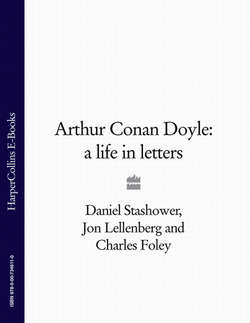Читать книгу Arthur Conan Doyle: A Life in Letters - Daniel Stashower, Исмаил Шихлы - Страница 113
to Mary Doyle RUYTON-XI-TOWNS, OCTOBER 19, 1878
ОглавлениеThis may be the last letter you receive from R, so make the most of it. There would be a nice train for me leaving Shrewsbury at 10 and getting in at 6, but alas there is no train from Baschurch to meet it. If Elliot was an obliging fellow I would ask a loan of one of his 3 horses and gigs, but he isn’t, so I must content myself with the 11:30 train, which gets in at 8.
The fare won’t be as much as I thought, but I have had to pay 4/ for having my [illegible] mended, and I owe my washer woman 5p.
By the way I boldly asked E last night whether he didn’t intend to allow me my fare back, but he didn’t seem to see it. According to him the law stands thus, that if an assistant has a salary he is then a recognized person, and can claim his expenses, but if he has no salary, he becomes as it were a gentleman travelling for his own improvement, and he gets nothing. A decidedly unfair regulation, I say, which pays the way of the man who has money already, and leaves the penniless one to shift for himself. However of course there is no redress except grumbling. I vow and declare (as the janitor says in the song) that the medical assistant is the most ill used, underpaid, hard worked fellow in the world. He does as a rule the work of a footman, for the wages of a cook, (that is the best of them do), and tho’ not acknowledged as gentlemen, or treated as one, he must keep up the appearance of one under pain of instant dismissal. Many men, you must remember, remain assistants all their lives. Good Heavens! What a life! I am very glad that I got this post, but the life is very different to what you or I expected. I have half a mind to write a letter to the Lancet to ‘disillusion’ young fellows who may have formed such notions of it as I did. I am not a hothouse plant, nor do I mind answering rings, or opening doors, but its the loneliness that I have felt most. You must know that the assistant is not supposed to consort at all or see the family except at meals. I didn’t know this at first, and since I was lonely I used to go into the drawing room, and chat to Mrs E or the baby, but I was informed that this was not the custom, the assistant must keep himself to himself. So now I sit in my room working and answering rings & concocting drugs all day, and haven’t had a talk with anyone for 3 months, except after supper sometimes, when I am permitted to come in & have my smoke.
There is a fine long grumble—but I don’t mind airing my grievances now, as they will soon be over.
The essay on intemperance expressed a long-lasting concern of his, perhaps sparked by father’s weakness for drink, that would surface repeatedly in his private correspondence and his fiction.
His third assistantship, with Dr Reginald Ratcliff Hoare of Clifton House, Aston Road, Birmingham, commenced in June 1879. It was ‘a five-horse city practice,’ said Conan Doyle, which ‘meant going from morning to night.’ His duties took him often into Birmingham’s slums, where he ‘saw a great deal, for better or worse, of very low life’. (Experience that served the author well later on.)
Dr Hoare paid him too, £2 a month, ‘a great boon and a good progress since last year,’ Conan Doyle’s sister Annette observed. (He had little free time to spend it, he noted in Memories and Adventures, ‘and it was as well, for every shilling was needed at home.’)
His 1910 Romance of Medicine talk did not mourn ‘the days of the unqualified assistant—a person who has now been legislated out of existence, with I have no doubt an excellent result upon the death rate.’ But his objections to the life evaporated with Reg and Amy Hoare, for his position ‘was soon rather that of a son than of an assistant’.
Family responsibilities still weighed on his mind, but his outlook blossomed in Birmingham. ‘The general aspiration towards literature was tremendously strong’ now, and he often went without lunch in order to spend the money on books. He also began to write as well as read, not only for medical journals, but for literary magazines as well. ‘Some friend remarked that my letters were very vivid and surely I could write some things to sell’, which surprised him.
I sat down, however, and wrote a little adventure story which I called ‘The Mystery of Sasassa Valley’. To my great joy and surprise it was accepted by Chambers’ Journal, and I received three guineas. It mattered not that other attempts failed. I had done it once and I cheered myself by the thought that I could do it again.
He also attended a lecture (mentioned in his January 1880 letter following) that marked the beginning of a journey concluding, forty years later, in his role as the world’s best-known spokesman for Spiritualism.
